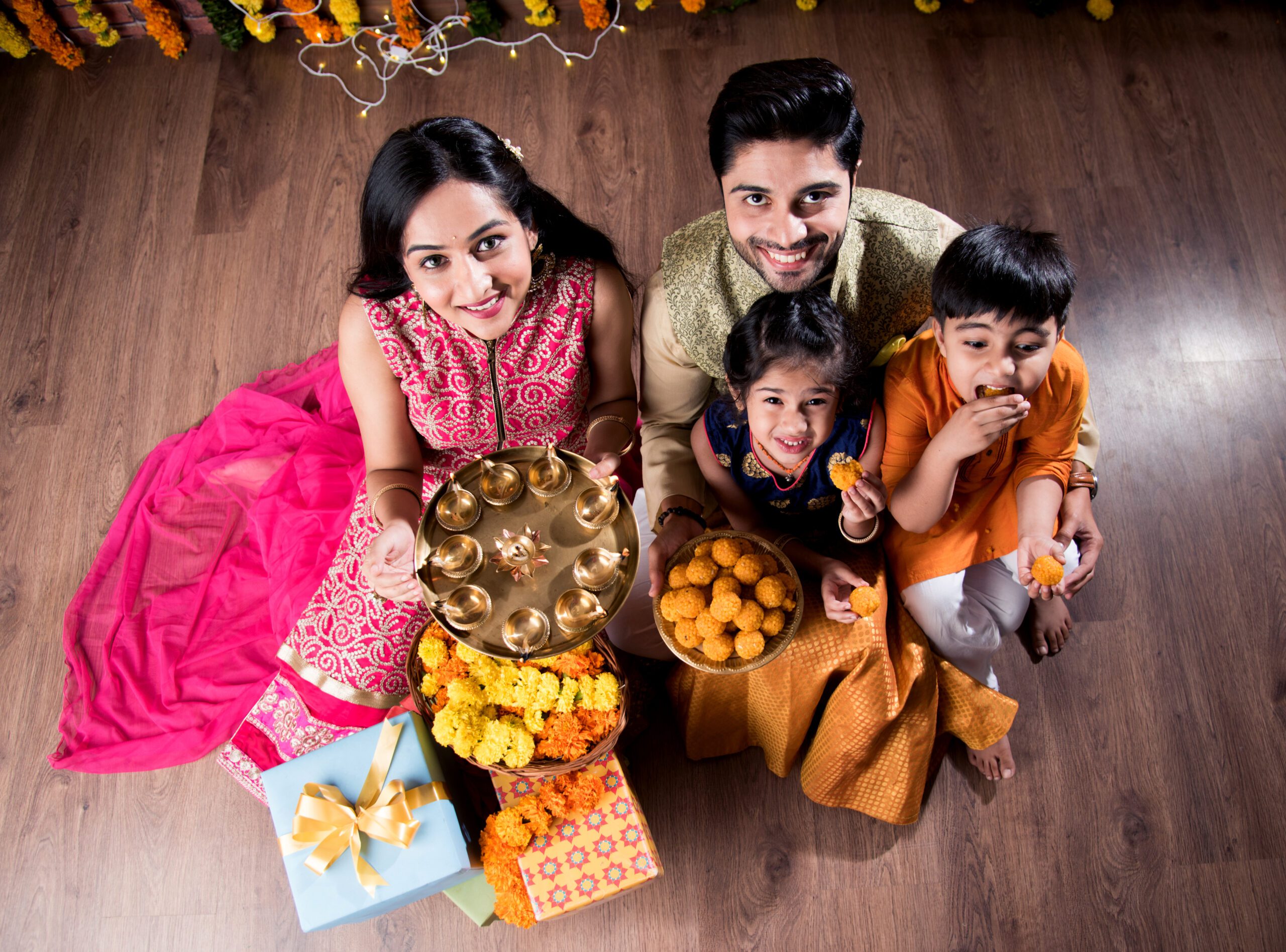
11 Oct 5 Things You Can Do To Take Care Of Your Mental Health & Emotional Well-being During Diwali
The festive season has begun in full swing. With Diwali – the festival of lights – around the corner you may be busy with house cleaning, painting, shopping, making sweets, and all the other hustle and bustle of the festival.
Diwali is a great time to spend with your friends and family. This festival also marks the beginning of a new year, making it the perfect time for self-reflection, development, and new beginnings.
One of the hallmarks of Diwali is the triumph of good over evil, and of light over darkness. All individuals experience this struggle in their lives as well – there is always an internal fight of right and wrong, healthy and unhealthy, rational and irrational, light and darkness. This internal fight is influenced by the world around us.
Together, this has an impact on your mental health and well-being. If you want to look at this new beginning as a way to focus on your mental health and emotional well-being, here are 5 things you can do!
Set Boundaries
While this may sound easy, it can be difficult to practise. A boundary is a limit you can set on what you will accept of another person’s words or actions. To protect your mental health, it is important to set boundaries with the people around you.
For example, you may be asked to work overtime or on your days off during Diwali. Consistently working without taking sufficient breaks, can lead to feeling overwhelmed and even burnout. Instead, you can set boundaries at the workplace and make it clear that you will not work during the festival, when you have time off.
You can also set boundaries in your personal life. There may be some topics you do not like talking about. During Diwali parties, if conversations veer towards those topics, you can make a request to change the topic, or excuse yourself from the conversation.
You can also set boundaries with respect to the people you meet and interact with during the festival. While social norms may dictate that you have to visit other people, or invite family and friends over, it is important to prioritize your own emotional well-being and mental health. If there are individuals whose homes you do not feel comfortable in, or if you find the idea of hosting people at your house stressful and anxiety-inducing, it is alright to take a step back from such social engagements.

Make a Plan
Diwali is a festival that has many customs that are meant to be followed. Right from house-cleaning, to painting, to preparing sweets and other foods, to decorating the house, to buying gifts, to preparing for the puja, there are many small tasks involved with the festival.
Most of us have already existing schedules which may be jam-packed and hectic. Along with this, all of the preparations involved can also be a financial burden. At such times, when we think about all the costs and effort of the preparations that need to be made for the festival, it can lead to stress and anxiety. When you don’t know how to handle this stress, it can lead you to feel frustrated and anxious and you may struggle to get things done.
It’s important in such scenarios to make a plan with all the things that need to be done, break them down, delegate responsibilities, schedule time for each task, and work bit by bit to complete everything you have on your checklist. This also helps you stay more organized and can help reduce stress and maintain good mental health.
Take Care of Your Physical Health
Your physical health and mental health are closely interrelated. When your physical health is ignored, it can take a toll on your mental health as well. During Diwali, there are many sweets and snacks prepared. The festival time and jolly mood of people around can lead to overindulging in foods that can make you feel lethargic and tired. Eating a lot of sugary foods or sweets can also lead to a sugar rush, followed by a sugar crash. Instead, try to find a balance between foods that are healthy and nutritious, and be mindful about your consumption of sweets and other snacks.
During Diwali, many people also consume a lot of alcohol while socializing with others. While these may be a part of the festivities in some areas, it can have consequences. Many people who are already feeling low, depressed or anxious, may drink more alcohol in an attempt to numb their emotions, however, this can be harmful for their physical and mental health.
It’s important that while enjoying the festival one must also attempt to maintain their physical health. Engaging in regular activity – such as yoga, exercise, dance, or any other form of movement, is a good habit. This also releases endorphins in the body and boosts your mood.
While Diwali is a festival celebrating light, a lot of the celebration takes place at night. The custom of lighting diyas can help spread light everywhere. However, when it comes to bursting crackers, fireworks, and sparklers, this can cause a lot of smoke and noise to be spread as well. This can lead to headaches, anxiety attacks, lack of sleep, getting easily startled, having accidents, and much worse. It’s important to be mindful of how you are celebrating the festival.
Make Time for Self-care
Self-care means taking care of yourself so that you can be healthy, you can be well, you can do your job, you can help and care for others, and you can do all the things you need to and want to accomplish in a day.
Engaging in self-care, involves doing activities that help replenish your energy and motivation levels. Everyone may have different ways in which they engage in self-care. For some individuals, self-care may involve having an elaborate skincare routine, for others it may involve engaging in a hobby, for some it may mean spending time with friends and family and to you it may mean something else entirely.
While Diwali is a busy time of the year, it is important to also make time for activities that allow you to take care of yourself. After all, when you engage in self-care it helps you feel better, cope with life’s challenges better, and be more present during the festival season.

Seek Professional Support
Diwali is one of the busiest times for hospitals, but this is usually due to many accidents that take place during the festival. Many regular check-ups and doctors appointments are often missed during this time. People also miss out on their sessions with their therapist. This often happens because individuals are busy preparing for the festival and want to focus on friends and family instead of their own well-being and health.
Not managing your mental health properly during the festive season then leads to post-festival blues. The feeling of sadness after a festival is known as The Post Festival Blues and is completely normal. Once the festival is over, there is an overwhelming feeling that the thing you were looking forward to is now over and gone. You may find yourself plagued with thoughts like ‘Did I make the most of it?’, ‘Did I miss out on something that I was planning on doing?’, ‘Did I sleep too much/too little?’.
When you continue to prioritize your mental health even during these festivities, it becomes easier to deal with the emotional ups and downs and all the thoughts that can otherwise feel overwhelming.
If you have never been to therapy before, Diwali is an auspicious time to begin. As the focus is on overcoming darkness with light, you can spread the same message inwards – allowing your dark thoughts to be overcome by light and positivity. A therapist can help you manage the worries and stressors that you may experience in your day-to-day life. It can also help you cope with any triggers that may come up during the festive season and help you maintain your emotional well-being and mental health.
Diwali is a time for hope, joy, laughter, family and light. Let’s celebrate this occasion, and celebrate you in the best way possible while still prioritizing your health and well-being!

No Comments